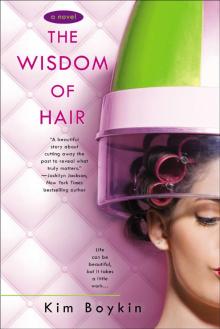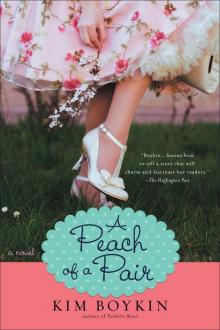- Home
- Kim Boykin
A Peach of a Pair Page 14
A Peach of a Pair Read online
Page 14
She used her finger to dab the Pan-Cake Make-Up on, that new Max Factor Hollywood brand she bought at the drugstore the other day. Blending and filling in the lines until she looked almost as ravishing as Evelyn Keyes, that actress on the advertisement that promised to create flattering new beauty . . . in just a few seconds. Lord, it was an actual wonder. Emily looked fantastic and she hadn’t even applied the new rouge and matching lipstick.
Emily smiled at her reflection, happy digging in her heels and bringing the clock to a screeching halt had actually worked. She might not be able to turn back the clock to when Lurleen was young and working out in her garden like a man, but with her healed, she’d have a few more good years left for sure. After all, barring tragedy, which the Eldridges were only too familiar with, they were long livers. And surely, after the heartache Emily and Lurleen’s generation had suffered, the Fates would smile on them. Or maybe good fortune skipped a generation like twins skipped a generation. Regardless, there would be no more Eldridges to carry on, unless Teddy had lived. And Emily had given up on that a long time ago.
The loss still made her well up, and when she dabbed her tears away, she noticed a wrinkle she’d missed; it was on the side she normally slept on. She spackled the thick makeup into the crease and made a note to sleep on her back from here on. Dusting herself with a generous amount of Evening in Paris powder, she stepped into her nylon slip and pulled it up over her brassiere before shimmying into her dress. Looking at herself in the cheval mirror, she realized the outfit cried out for her mother’s pearls, which were a bit much just to go to the bus station.
Pocketbook on arm and carrying her shoes, she started down the stairs in her stocking feet, carefully navigating the staircase that normally made her knees weep, her hips ache, but not today. At the bottom of the stairs, she slipped into her shoes just as the girl was coming out of Lurleen’s room.
“I’m going to the bus station to buy our tickets for the trip and will be back shortly,” Emily announced. The girl nodded. “I’m buying your ticket as well; you’re lucky I’m not taking it out of your stipend. If I thought Sister wouldn’t pitch a fit, I would.”
“Thank you,” she said evenly.
Emily put her short, white gloves on and started out the door, down the front steps, headed toward DeKalb Street. It was a beautiful walk; Camden was in all her glory, bursting with azaleas and dogwoods. Emily’s whole body sang with anticipation for this journey to heal Lurleen. At first, Emily had felt a little selfish when she brought the idea up to Lurleen, but after everything she’d taken from Lurleen, so long ago, surely giving her a few more good years would come closer to setting things right. Though the scales would never be balanced.
By the time she set foot in the Greyhound station, she was almost breathless with exhilaration. She propped her pocketbook up on the counter. On the other side, a young man who looked every bit like a skinny beatnik with his unkempt hair and goatee raised his eyebrows like Emily was some kind of bothersome old woman. “Help you?”
No ma’am or may I. Emily didn’t recognize the boy, but even if he’d changed remarkably since she taught sixth grade, she knew he wasn’t one of her students who had good manners ingrained into their beings whether they liked it or not. He was not nor would he ever be handsome, not like some men are, the spindly ones who are scrawny when they are young but age into their bodies much later in life. No potbelly, slim, their awkward faces etched with age, making them handsome.
“Yes, you may help me. May I have three tickets to Palestine, Texas? Please,” Emily said, emphasizing the proper words because it was never too late to learn good etiquette. Even for a beatnik.
He pulled three tickets off of a stack, jotted some information on them, stamped each one, and pushed them across the counter. “Eighty-four ninety-seven.”
Emily pulled out her checkbook and a pen and started writing the date.
“No checks,” the beatnik said.
“Young man, did no one teach you the first speck of manners? It’s no checks ma’am. And why the h. not?”
“Because the sign says so,” he said with the most insolent look, pointing to the sign in front of her. Emily wanted to take her shoe off and tan his behind. Even if he was a good bit bigger than she. “Cash only.”
Emily looked at the sign, then back at him. “I know you don’t know me, but I’m Emily Eldridge. I’ve lived in this town for—well, since I was born. I bank at South Carolina National Bank; my father banked there and his father before him. I’m sure you can take a personal check from me.”
He put the tickets back in the till.
“Young man, I’m a retired schoolteacher and Sunday school teacher at Bethesda Presbyterian Church. There’s no need for me to walk three blocks to the bank in these shoes,” Emily said, pointing at her pink pumps, but the boy didn’t even bother to look.
“No cash. No tickets,” he said, tossing his scraggly hair.
Well, if Emily wasn’t already burned up, that look did it. She marched herself up Broad Street, feet swelling and throbbing. The girl behind the counter, Emily couldn’t recall her name, but she’d taught her in the forties. She’d been quiet and kept to herself, and her name was right on the tip of Emily’s tongue when she blushed and pushed the money through the teller window. Even put it in one of those handy cloth bags that were so convenient; Emily used them to launder her undergarments in when she remembered.
By the time Emily paraded back into the Greyhound station she was breathless, and that little nitwit actually had the nerve to roll his eyes. “May I have three tickets to Palestine, Texas? Please.”
“Eighty-four ninety-seven. Cash,” he said, holding out his hand.
Emily opened the bag and dumped the pennies onto the counter.
“What the hell?”
“Don’t you dare swear at me young man. You. Making me go to the bank, like my check is no good. Be ashamed of yourself,” Emily huffed. “Now you count every blasted one of those coins and give me my tickets or I’m going to use that pay phone just outside this place to call your superiors. Perhaps I should do that anyway and suggest that they hire someone with some manners.”
He started over twice because he lost count, and it took him the better part of a half hour before he just shoved the money in the till and handed Emily the tickets.
“Thank you,” Emily said. “Have a pleasant day.”
LURLEEN
Nettie brought Lurleen’s lunch tray in and set it on the bedside table. She hadn’t said much since Remmy’s visit yesterday. Lurleen had no idea if Nettie wanted to go on this pilgrimage Emily was forcing on them, but she suspected after almost two weeks under the Eldridge roof, Nettie had learned not to cross Emily.
“Chicken salad,” she announced. “Oh, and I minced up some apples and put it in to make it a little sweet. My mother does that. When apples aren’t in season, she’ll use white raisins if she has them. Oranges too. They’re my favorite.” She whispered the last word like it was painful.
“Do you miss home?” Lurleen asked.
“Some things I miss,” she paused. “Yes.”
“I never asked you much about, where was it? Mobile, Alabama?”
“Near there. Satsuma.”
“I got the feeling that the less questions I asked, the better.”
Her whole body went stiff and she blushed hard. “You didn’t think I was—expecting, did you?”
“Well, yes.” Lurleen hoped her smile was reassuring. “But I could tell when I met you that you’re a good girl, Nettie. And that certainly wouldn’t have made you bad. Not in my eyes anyway.”
“Thank you,” she said awkwardly.
Lurleen propped herself up on the pillows, pulled the tray onto her lap, and tasted the chicken. No wonder Emily was jealous of Nettie; she really had a way with food.
“May I ask you a question?” Nettie said. Lurleen nodd
ed and dabbed at her mouth with the napkin. “Why is the piano off-limits?”
“Did Emily tell you it is?”
“Without words, yes,” Nettie said.
“It was our mother’s piano, a wedding gift from our father. But after our little brother Teddy came along, he took it over. Oh my, how he could play. For hours, never reading a note of music, yet every note was perfect. Then there was a tragedy and he never touched the piano again; neither did our mother.”
“I’m sorry. Your brother must have been a natural,” Nettie said, straightening up around the bed; then she glanced at Lurleen. “Oh, I’m sorry. I didn’t mean to upset you.”
“Yes, Teddy played by ear.” Lurleen swiped at her tears. “He was remarkable; he made simple Chopsticks sound as beautiful as Strauss’s finest waltz. That was always the song he tried to lure Emily and me to the piano with. Both of us were hopeless, but it kind of became our song. It’s hard to hear a piano and not think about Brother. Chopsticks.”
“It’s really hard to walk by it so many times a day and not sit and play,” she said hesitantly. “I’ve touched it once; the keys didn’t work, and then Miss Emily looked at me.”
Lurleen smiled. “Don’t let her intimidate you, Nettie. While you’re living under my roof, this is your house too.” But did she really want Nettie to make the spinet sing again? She had no doubt that she was an accomplished musician; just the same, there was something about the piano remaining silent that was as comforting as it was disturbing.
“Thank you. I don’t think Miss Emily was trying to be mean.” That was a kind assessment. “She seemed more pained than anything, and I would never hurt either of you by playing.”
Lurleen finished the chicken salad, scraping the bowl to get every bit. “I know you won’t, my dear.” Still, Lurleen couldn’t help wondering what it would be like to hear Brother’s old piano again. Lurleen and Sister had braced themselves for so long, as if the sound might break the both of them in two. And who knows? Maybe it would.
“And may I ask you another question, Nettie?”
“Yes, of course.” She sat down beside the bed. “If it’s about the piano, I can tell you almost anything you want to know.”
“It’s not about the piano,” Lurleen said. “It’s about you.”
“All right.” She swallowed hard.
“What are you afraid of, Nettie?”
“Lots of things.” Her laugh was nervous. “Snakes. Failure. Heights.”
“No, I mean with Remmy.”
“There’s nothing going on with him.” She blushed hard. “He did visit a few nights. We just sat on the porch and talked. But that’s all. He’s really not for me,” she said like she was trying to convince herself.
“That’s what I told myself when I first met John. I was so afraid to open myself up to the possibility of love; it was much easier to keep my nose stuck in a book. But he was persistent as I suspect Remmy is, and I know him to be a good man. Someone you can trust.”
“It doesn’t matter how good or persistent Remmy is, I’ll never leave my heart unguarded again. And when I’m around Remmy—” She stopped and hung her head.
“You feel open. Exposed.” Nettie looked at Lurleen and nodded. “More vulnerable than you’ve ever felt in your life, which feels horrible and wonderful all at the same time.”
“Yes, how did you know?”
“Because I stood on the edge of my fears once, and I let myself fall,” Lurleen said, her fingers drawing little circles on the bedspread.
“And he broke your heart?”
“Not intentionally, but yes.”
That day John had come into to the library, she’d just come back from lunch. She’d walked all the way back from the lunch counter, her nose in a book. She was reading the new copy of The Importance of Being Earnest that had just come in. The only other copy the library had had disappeared a year earlier when one of the Rosemont girls fell in love with reading. The girl was also a bit of a kleptomaniac then, although she thankfully grew out of it later on in life.
But that afternoon when Lurleen left the lunch counter, she had been vaguely aware someone was walking behind her, almost beside her. It was easy to tune people out, especially with the help of Oscar Wilde. She glanced up to see the library just ahead, then read the next sentence and threw her head back laughing. When she reached the door, from out of nowhere, a hand opened it and she stepped inside and took her place behind the counter. Shoving her pocketbook in a cubbyhole along with her book to finish later. When she looked up, the most beautiful man she’d ever seen was standing there, looking at Lurleen the way Emily’s suitors looked at her.
“Can I help you?” she’d stammered, which was odd. She’d never had any trouble talking to a man; she did it all the time when she attended church socials, hunted with her father’s buddies. It made her nervous when the beautiful man didn’t answer, and Lurleen didn’t get nervous; she was a librarian for God’s sake. “Can I help you find a book?” she said firmly.
“That must be a good one,” he said, eyes smiling as he pointed at the cubby. “I followed you for eight blocks and you didn’t look up once, not even to cross the street. That’s not safe.”
That just didn’t happen to Lurleen, some Adonis tracking her down, unless of course they were trying to elicit her help to get Emily to notice them. “I have excellent peripheral vision,” she’d huffed, but inside her heart was flipping over.
“I heard, and I hear you’re quite the huntress as well,” he said. He gabbed on and Lurleen didn’t hear a word he said, just nodded blankly. “I’m John Young, by the way. I was hoping you’d do me the honor of having dinner with me.”
And that was all it took; his crooked smile sealed the deal and Lurleen fell over the edge before she spent one moment with him and listened to his hearty laugh, to his voice that rumbled low and did things to her body she didn’t quite understand and would never have believed were possible. She was shocked to learn how wonderful he thought it was that she loved guns and hunting. A direct departure from the rest of the world, who thought she was an odd duck to begin with because she surrounded herself with books. Add the fact she was a crack shot, and, well, it just didn’t make any sense that this Adonis was asking her for anything, much less a date. But she said yes that day to John Young, and she never stopped saying yes.
“I’m sorry,” Nettie said softly. “I couldn’t survive being hurt again, not like Brooks hurt me.”
“That’s understandable.” Lurleen never had the time or the inclination to fall for anyone in her twenty-two years prior to meeting John. Besides, even when the sisters were in college, most of Lurleen’s potential suitors were Emily’s throwaways, which right off the bat was three strikes. No, Lurleen had read enough romance novels to know that one day her prince would come. And he did.
When Nettie took the tray away and closed the door, Lurleen glanced at the small suitcase Emily had drug out of the carriage house. She sat up with her legs dangling over the side of the bed, taking care to let her head settle before she stood and inched her way over to her chifforobe. She’d wanted to lose some weight for some time. In her old age her body had become quite boxy. Not that Lurleen ever thought she’d look willowy and beautiful like Emily always had; she still did.
She tried on her best housedress, knowing if she put on anything less tomorrow, Emily would fuss a blue streak. It hung on her like a sack, making her feel even sicker. Older. Well, she wasn’t going to walk all the way to Karesh’s Fashion Shop for a new dress; she couldn’t, and Emily would never mention the ill-fitting garment. It would be a confirmation that Lurleen was too sick to make this blasted trip in the first place; a confirmation that she really was dying, and Emily herself would die before she admitted that.
Lurleen packed some undergarments and two more housedresses, a nightgown. She hated to haul her good gray linen suit hither thither a
nd yon. It would be a wrinkled mess when the time came to wear it, but it couldn’t be helped. Of course, Kornegay’s here in Camden would handle the arrangements when she passed, but Lurleen wasn’t sure if they would be able to change her into her funeral suit after her body was shipped home. As much as she didn’t care about so many of the frivolous things Emily cared about, she really didn’t want to ride across the country underdressed. Even if it was in the back of a hearse, Emily would never let her hear the end of it.
18
NETTIE
Almost four weeks ago, I was standing in a receiving line in the dining room at Columbia College for the alumnae dinner celebrating 119 years of sisterhood. All of the senior sisters were side by side their sophomore little sisters. Several girls, including me, were stag as there was a rash of girls who received diamonds over the Christmas holiday who didn’t bother to finish out the school year.
While I’d taken offense to Remmy’s insinuation that dear old C-Square was a glorified finishing school for girls who wanted an engagement ring more than they wanted their degree, there was a fair amount of that. Even without a ring, I was relieved when Brooks had officially proposed at Christmastime and excited about the prospects of being chosen, validated. Married. After I returned to school, I went through the motions, not fully appreciating those last moments of being Nettie Gilbert, completely focused on being little more than Brooks Carver’s wife.
That night at the reception, I was glowing in my sapphire blue gown, shaking hands, greeting fellow sisters and faculty. Inwardly, I was a mess, tangled up in worry, sure someone I knew and loved back home was dead, most likely Brooks. As horrible as receiving Mother’s note complete with an invitation to Brooks and Sissy’s wedding was, at least I didn’t have to wrestle with the unknown anymore. Pretend I was fine when I definitely wasn’t.

 Just In Time for Christmas
Just In Time for Christmas Flirting with Forever (Island Bliss)
Flirting with Forever (Island Bliss) Steal Me, Cowboy (Copper Mountain Rodeo)
Steal Me, Cowboy (Copper Mountain Rodeo) Caught Up in You
Caught Up in You The Wisdom of Hair
The Wisdom of Hair Zen for Christians: a beginner's guide
Zen for Christians: a beginner's guide A Peach of a Pair
A Peach of a Pair